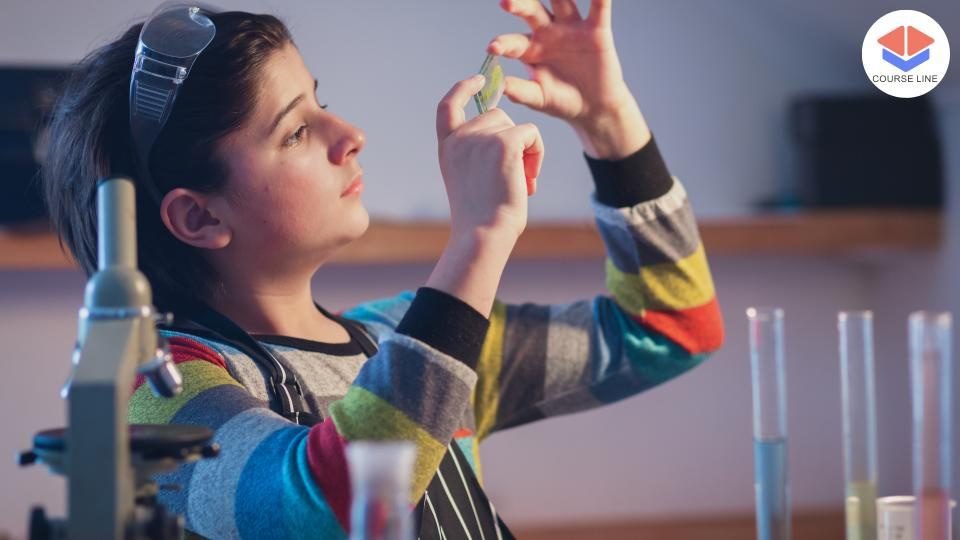Course Features
Price
Study Method
Online | Self-paced
Course Format
Reading Material - PDF, article
Duration
15 minutes
Qualification
No formal qualification
Certificate
At completion
Additional info
Coming soon
- Share
Overview
The Scottish Higher Chemistry: Reactions, Bonding & Energy Changes course offers an in-depth exploration of key chemical principles that shape our understanding of matter and energy. Aligned with the Scottish Qualifications Authority (SQA) Higher Chemistry curriculum, this course provides a comprehensive learning experience that prepares students for academic success and scientific literacy.
The course begins with a close examination of chemical reactions and the factors that influence their speed and direction. Students learn about collision theory, activation energy, and how variables such as temperature, concentration, and catalysts affect reaction rates. Practical activities and real-world examples help contextualise theoretical knowledge, while students also explore reversible reactions and chemical equilibrium—essential concepts in both academic chemistry and industrial applications.
In the second module, learners dive into the nature of chemical bonding and the structures that result from atomic interactions. Lessons cover ionic, covalent, and metallic bonding, as well as intermolecular forces, periodic trends, and how these factors determine the physical properties of substances. Through the study of bonding in everyday materials, students gain insight into how chemistry underpins technologies and products used in modern life.
The final section of the course focuses on energy changes in chemical processes. Students explore the distinction between exothermic and endothermic reactions, learn how to calculate enthalpy changes, and use calorimetry techniques to measure energy transfer. Additional lessons on fuels, energy efficiency, and sustainability promote awareness of how chemistry contributes to global energy solutions and environmental responsibility.
Each lecture includes guided revision, assessment tasks, and practical applications to reinforce learning and prepare students for the SQA exam. With a focus on scientific inquiry, problem solving, and real-life relevance, this course supports learners in developing both theoretical understanding and practical competence in chemistry.
Who is this course for?
The Scottish Higher Chemistry: Reactions, Bonding & Energy Changes course offers an in-depth exploration of key chemical principles that shape our understanding of matter and energy. Aligned with the Scottish Qualifications Authority (SQA) Higher Chemistry curriculum, this course provides a comprehensive learning experience that prepares students for academic success and scientific literacy.
The course begins with a close examination of chemical reactions and the factors that influence their speed and direction. Students learn about collision theory, activation energy, and how variables such as temperature, concentration, and catalysts affect reaction rates. Practical activities and real-world examples help contextualise theoretical knowledge, while students also explore reversible reactions and chemical equilibrium—essential concepts in both academic chemistry and industrial applications.
In the second module, learners dive into the nature of chemical bonding and the structures that result from atomic interactions. Lessons cover ionic, covalent, and metallic bonding, as well as intermolecular forces, periodic trends, and how these factors determine the physical properties of substances. Through the study of bonding in everyday materials, students gain insight into how chemistry underpins technologies and products used in modern life.
The final section of the course focuses on energy changes in chemical processes. Students explore the distinction between exothermic and endothermic reactions, learn how to calculate enthalpy changes, and use calorimetry techniques to measure energy transfer. Additional lessons on fuels, energy efficiency, and sustainability promote awareness of how chemistry contributes to global energy solutions and environmental responsibility.
Each lecture includes guided revision, assessment tasks, and practical applications to reinforce learning and prepare students for the SQA exam. With a focus on scientific inquiry, problem solving, and real-life relevance, this course supports learners in developing both theoretical understanding and practical competence in chemistry.
Requirements
The Scottish Higher Chemistry: Reactions, Bonding & Energy Changes course offers an in-depth exploration of key chemical principles that shape our understanding of matter and energy. Aligned with the Scottish Qualifications Authority (SQA) Higher Chemistry curriculum, this course provides a comprehensive learning experience that prepares students for academic success and scientific literacy.
The course begins with a close examination of chemical reactions and the factors that influence their speed and direction. Students learn about collision theory, activation energy, and how variables such as temperature, concentration, and catalysts affect reaction rates. Practical activities and real-world examples help contextualise theoretical knowledge, while students also explore reversible reactions and chemical equilibrium—essential concepts in both academic chemistry and industrial applications.
In the second module, learners dive into the nature of chemical bonding and the structures that result from atomic interactions. Lessons cover ionic, covalent, and metallic bonding, as well as intermolecular forces, periodic trends, and how these factors determine the physical properties of substances. Through the study of bonding in everyday materials, students gain insight into how chemistry underpins technologies and products used in modern life.
The final section of the course focuses on energy changes in chemical processes. Students explore the distinction between exothermic and endothermic reactions, learn how to calculate enthalpy changes, and use calorimetry techniques to measure energy transfer. Additional lessons on fuels, energy efficiency, and sustainability promote awareness of how chemistry contributes to global energy solutions and environmental responsibility.
Each lecture includes guided revision, assessment tasks, and practical applications to reinforce learning and prepare students for the SQA exam. With a focus on scientific inquiry, problem solving, and real-life relevance, this course supports learners in developing both theoretical understanding and practical competence in chemistry.
Career path
The Scottish Higher Chemistry: Reactions, Bonding & Energy Changes course offers an in-depth exploration of key chemical principles that shape our understanding of matter and energy. Aligned with the Scottish Qualifications Authority (SQA) Higher Chemistry curriculum, this course provides a comprehensive learning experience that prepares students for academic success and scientific literacy.
The course begins with a close examination of chemical reactions and the factors that influence their speed and direction. Students learn about collision theory, activation energy, and how variables such as temperature, concentration, and catalysts affect reaction rates. Practical activities and real-world examples help contextualise theoretical knowledge, while students also explore reversible reactions and chemical equilibrium—essential concepts in both academic chemistry and industrial applications.
In the second module, learners dive into the nature of chemical bonding and the structures that result from atomic interactions. Lessons cover ionic, covalent, and metallic bonding, as well as intermolecular forces, periodic trends, and how these factors determine the physical properties of substances. Through the study of bonding in everyday materials, students gain insight into how chemistry underpins technologies and products used in modern life.
The final section of the course focuses on energy changes in chemical processes. Students explore the distinction between exothermic and endothermic reactions, learn how to calculate enthalpy changes, and use calorimetry techniques to measure energy transfer. Additional lessons on fuels, energy efficiency, and sustainability promote awareness of how chemistry contributes to global energy solutions and environmental responsibility.
Each lecture includes guided revision, assessment tasks, and practical applications to reinforce learning and prepare students for the SQA exam. With a focus on scientific inquiry, problem solving, and real-life relevance, this course supports learners in developing both theoretical understanding and practical competence in chemistry.
-
-
- Premium Certificate 00:15:00

No Reviews found for this course.
Is this certificate recognized?
Yes, our premium certificate and transcript are widely recognized and accepted by embassies worldwide, particularly by the UK embassy. This adds credibility to your qualification and enhances its value for professional and academic purposes.
I am a beginner. Is this course suitable for me?
Yes, this course is designed for learners of all levels, including beginners. The content is structured to provide step-by-step guidance, ensuring that even those with no prior experience can follow along and gain valuable knowledge.
I am a professional. Is this course suitable for me?
Yes, professionals will also benefit from this course. It covers advanced concepts, practical applications, and industry insights that can help enhance existing skills and knowledge. Whether you are looking to refine your expertise or expand your qualifications, this course provides valuable learning.
Does this course have an expiry date?
No, you have lifetime access to the course. Once enrolled, you can revisit the materials at any time as long as the course remains available. Additionally, we regularly update our content to ensure it stays relevant and up to date.
How do I claim my free certificate?
I trust you’re in good health. Your free certificate can be located in the Achievement section. The option to purchase a CPD certificate is available but entirely optional, and you may choose to skip it. Please be aware that it’s crucial to click the “Complete” button to ensure the certificate is generated, as this process is entirely automated.
Does this course have assessments and assignments?
Yes, the course includes both assessments and assignments. Your final marks will be determined by a combination of 20% from assignments and 80% from assessments. These evaluations are designed to test your understanding and ensure you have grasped the key concepts effectively.
Is this course accredited?
We are a recognized course provider with CPD, UKRLP, and AOHT membership. The logos of these accreditation bodies will be featured on your premium certificate and transcript, ensuring credibility and professional recognition.
Will I receive a certificate upon completion?
Yes, you will receive a free digital certificate automatically once you complete the course. If you would like a premium CPD-accredited certificate, either in digital or physical format, you can upgrade for a small fee.
Course Features
Price
Study Method
Online | Self-paced
Course Format
Reading Material - PDF, article
Duration
15 minutes
Qualification
No formal qualification
Certificate
At completion
Additional info
Coming soon
- Share
Level 7 Advanced Diploma in Dietetics
Kazi Shofi Uddin Bablu239£490.00Original price was: £490.00.£14.99Current price is: £14.99.Waxing Techniques Level 3 Advanced Diploma
Course Line242£490.00Original price was: £490.00.£14.99Current price is: £14.99.Teaching Essentials for Assessors Level 3 Advanced Diploma
Course Line238£490.00Original price was: £490.00.£14.99Current price is: £14.99.





